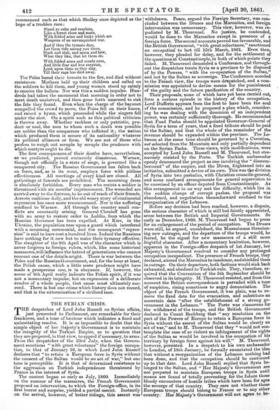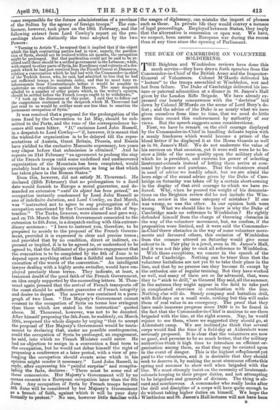THE SYRIAN CRISIS. T UE despatches of Lord John Russell on
Syrian affairs, just presented to Parliament, are remarkable for their frankness, and a tone of hauteur which indicates a fixed and unhesitating resolve. It is as impossible to doubt that the simple object of her Majesty's Government is to maintain the integrity of the Turkish Empire, as to question that they are prepared, iu that view, to appeal if necessary, to arms. From the despatches of the 23rd July, when the Govern- ment sanctions " with great reluctance" the foreign occupa- tion, to that of January 16, in which Lord John Russell declares that "to retain a European force in Syria without the consent of the Sultan would be an act of war," but one tone is perceptible. It is that of determined resistance to the aggression on Turkish independence threatened by France in the interest of Syria. The contest began so early as July, 1860. Immediately on the rumour of the massacres, the French Government proposed an intervention, to which the Foreign-office, in its first horror and surprise, yielded a partial assent. Instantly - on the arrival, however, of better tidings, this assent was commenced such as that which Shelley once depicted as.the I withdrawn. Peace, argued the Foreign Secretary, was cm-- hope of a trodden race : eluded between the Druses and the Maronites, and foreign intervention was unnecessary. This view, however, was re- pudiated by M. Thouvenel. No justice, he contended, would be done to the Maronites except in presence of a foreign force. The second accounts proved too favourable, and the British Government, "with great reluctance," sanctioned an occupation to last till 15th March, 1861. Even then, however, they pleaded for delay, and for the settlement of the questions at Constantinople, in both of which points they failed. M. Thouvenel demanded a Conference, and through- out the despatches treats Syria as a province to be disposed of by the Powers, " with the co-operation of the Sultan," and not by the Sultan as sovereign. The Conference acceded to the French view, the troops were despatched, and a com- mission was appointed to devise means for the punishment of the guilty and the future pacification of the country. Their proposals, none of which have yet been Carried out, form a curious episode in the history of the occupation. Lord Dufferin appears from the first to have been the soul of the commission, and he proposed a plan which, consider.. ing he was dealing with the dominion of an independent power, was certainly sufficiently thorough. He recommended that Fuad Pasha should be appointed Governor-General of Syria for a term of years, that a fixed tribute should be paid to the Sultan, and that the whole of the remainder of the revenue should be expended within the province. The Le- banon at the same time should be governed by a Christian, not selected from the Mountain and only partially dependent on the Syrian Pasha. These views, with modifications, were accepted by Lord John Russell and M. Thouvenel, but stre- nuously resisted by the Porte. The Turkish ambassador openly denounced the project as one involving the " dismem- berment" of the empire, and the Divan, frightened into an initiative, submitted a device of its own. This was the division of Syria into two pashalics, with Christian councils-general, and some confused arrangements for general supervision to be exercised by an officer deputed from Constantinople. As this• arrangement in no way met the difficulty, which lies in the sudden change of corrupt pashas, the proposal was abandoned, and negotiation thenceforward confined to the reorganization of the Lebanon. Before any decision had been reached, however, a dispute, the serious character of which is still but faintly appreciated, arose between the British and Imperial Governments. So early as December, 1860, M. Thouvenel had begun to press for an enlargement of the period of occupation. The Druses were still, he argued, unsubdued, the Mussulmans threaten- ing new outrages, and the departure of the troops would, he feared, be the signal for new massacres of a still more frightful character. After a momentary hesitation, however, apparent in the Foreign-office despatch of 1st January, her Majesty's Government resolved to consider any prolonged occupation inexpedient. The presence of French troops, they declared, stirred the Maronites to insolence, andshielded them in outrage. On their departure, both factions would sink back exhausted, and obedient to Turkish-rule. They, therefore, re- quired that the Convention of the 5th September should he observed in its integrity. M. Thouvenel resisted, and from this moment the British correspondence is pervaded with a tone of suspicion, rising sometimes to angry denunciation. The object of the French Government, it was plain, was to re- move the fixed date for the evacuation, and substitute an uncertain date "after the establishment of a strong go- vernment in the Lebanon." The Porte was clamorous for the withdrawal of the troops, and the British Government declared to Count Rechberg that " any resolution on the part of the Powers of Europe to retain a European force m Syria without the assent of the Sultan would be clearly an act of war," and to M. Thouvenel that they " would not con- template the case of so violent an infringement of the rights of the Sultan as would be involved in the occupation of his territory by foreign force against his will." M. Thouvenel, however, persisted. In a despatch to his own ambassador in London, of 18th January, lie formally enunciated the idea that without a reorganization of the Lebanon nothing had been done, and that the occupation should be continued up to that date. Lord John Russell replied that Syria be- longed to the Sultan, and " Her Majesty's Government are not prepared to maintain European troops in Syria until means are found of totally preventing for the future those bloody encounters of hostile tribes which have been for ages the scourge of that country. They care not whether those European troops should belong to France or to any other country.' Her Majesty's Government will not agree to be- come responsible for the future administration of a province of the Sultan by the agency of foreign troops." The con- ference, however, took place on the 19th February, and the following extract from Lord Cowley's report on the pro- ceedings shows distinctly the tone adopted by the two Powers : "Turning to Article V., he argued that it implied that if the object which the high contracting parties had in view, namely, the pacifica- tion of Syria, should not be realized within six months, the occupation might be prolonged. But that pacification could not be said to be re- alized until there should be a settled government in the Lebanon ; while, with regard to other parts of Syria, his Excellency read extracts of a des- patch which he had )ust received from the French Consul at Damascus, relatina conversation which he had had with the Commander-in-chief of the Turkish forces, who, he said, had admitted to him that he had not sufficient troops to maintain order, and that he must have re- inforcements from Constantinople before it would be possible to undertake an expedition against the Hauran. The same despatch alluded to a number of other points which, in the writer's opinion, should be settled before the French troops ought to be withdrawn."
" I took up the discussion at this point. I said that to follow out the suggestions contained in the despatch which M. Thouvenel had just read to us would be neither more nor less than to sanction the permanent occupation of Syria."
It was resolved that a proposal for the prolongation of the term fixed by the Convention to 1st May, should be sub- mitted to the Porte, and the tone of the correspondence be- comes still more bitter. "If," exclaims Lord John Russell, in a despatch to Lord Cowley—" if, however, it is meant that the wished-for organization is to be delayed till the repre- sentatives of Austria, Great Britain, Prussia, and Russia have yielded to the exclusive Maronite supremacy, ten years may elapse before that submission is obtained." And he repeats on 21st February " an agreement to prolong the stay of the French troops until some undefined and undiscovered organization of the Mountain has been completed, would probably lead to a foreign occupation as long as that which has taken place in the Roman States." Even this, however, did not satisfy M. Thouvenel. He declared (25th February) that no prolongation to a fixed. date would furnish to Europe a moral guarantee, and de- manded an extension "until its object has been gained," an occupation instantly condemned by Lord John Russell as one of indefinite duration, and Lord Cowley, on 2nd March, was " instructed not to agree to any prolongation of the occupation sanctioned by the Convention of the 5th of Sep- tember." The Turks, however, were alarmed and gave way, and on 7th March the British Government consented to the extension to 5th June, in a despatch ending with this extraor- dinary sentence : " I have to instruct you, therefore, to be prepared to accede to the proposal of the French Govern- ment, provided it is expressed in clear and precise terms ; and provided that by no condition, direct or indirect, ex- pressed or implied, it is to be agreed to, or understood to be agreed to, that the fulfilment of the positive engagement that the evacuation is to be completed by the 5th of June is to depend upon anything other than a faithful and honourable execution of the words of the convention." An intelligent lawyer dealing with a highly acute swindler, would have em- ployed precisely those terms. They indicate, at least, a transient doubt of the good faith of the French Government, an idea amply supported by the succeeding letters. M. Thou- vend again pressed that the arrival of French transports off the coast should be sufficient guarantee of French integrity and desire to depart. The answer was contained in a para- graph of two lines. " Her Majesty's Government cannot consent to the occupation of Syria on terms less stringent than those which are stated in the instruction" quoted above. M. Thouvenel, however, was not to be daunted. After himself proposing the 5th June, he suddenly, on March 10th, reopened the whole dispute by urging " that to accept the proposal of Her Majesty's Government would be tanta- mount to declaring that, under no possible contingencies, could the occupation of Syria be prolonged, an engagement, he said, into which no French Minister could enter. He had no objection to assign in a convention a final term to the occupation, but he would not debar himself the right of proposing a conference at a later period, with a view of pro- longing the occupation should events arise which in his Opinion might render it necessary." Lord John Russell, in reply, after expressing his " painful surprise" and recapitu- lating the facts, declares : " There must be some end of these concessions. Her Majesty's Government will by no means consent to a European occupation later than the 5th June. Any occupation of Syria by French troops beyond 5th June will be considered by her Majesty's Government as a breach of faith, against which it will be your duty formally to protest." No one, however little familiar with . the usages of diplomacy, can mistake the import of phrases such as these. In private life they would convey a menace of legal proceedings. Employed between States, they imply that the alternative is concession or open war. We have, we suspect, been nearer a European war during the recess than at any time since the opening of Parliament.































 Previous page
Previous page